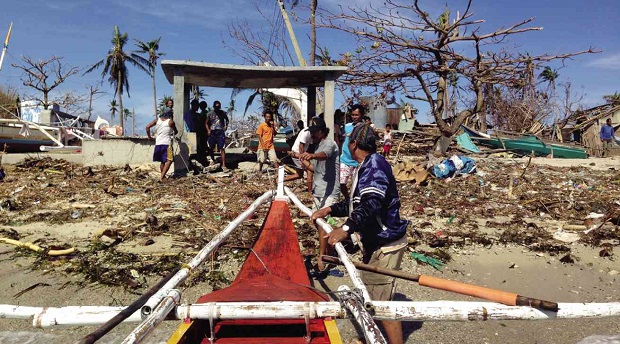‘No-dwelling zones’ stump mayors

SUPERTYPHOON “Yolanda” has turned a paradise into a wasteland after strong winds ravaged “Little Boracay,” the island-village of Olotayan in Roxas City, Capiz province. MARICAR CINCO/INQUIRER SOUTHERN LUZON
CAPIZ—International humanitarian agencies and municipal mayors in typhoon-hit areas on Panay Island have questioned the government’s “no-dwelling zone” (NDZ) policy amid fears that nearly 70,000 families will be dislocated.
Some 350,000 people (69,300 families) will be affected by the implementation of the NDZ in the provinces of Aklan, Antique, Capiz and Iloilo alone. They include 36,300 families in Iloilo, 16,000 in Aklan, 12,000 in Capiz and 5,000 in Antique, according to estimates of government agencies.
In Panay alone, an estimated P6 billion is needed to acquire, develop and construct houses on at least 145 hectares of land.
President Aquino has directed the Department of Environment and Natural Resources to clear the coastlines considered vulnerable to storm surges and flooding in the aftermath of the massive devastation left by Supertyphoon “Yolanda” on Nov. 8, 2013.
Under the proposed policy, no-build zones (NBZs) will be set up 40 meters from the high-water mark to the coastline. Reconstruction of houses destroyed or damaged by the typhoon is prohibited in the zones.
Article continues after this advertisementModified policy
Article continues after this advertisementIn February, former Sen. Panfilo Lacson, presidential assistant for rehabilitation and recovery, said the NBZ would be modified to the NDZ to allow tourism-related infrastructure.
Last week, Lacson recommended that the risk areas be classified into “safe” and “unsafe” zones and NDZs be identified based on specific risks.
No structures will be built in the unsafe zones, while areas considered unsafe but are needed for commercial and livelihood purposes—such as areas where fishermen build structures—will be classified as NDZs, he suggested.
The local government units will issue the appropriate ordinance with respect to land use, according to Lacson.
But several mayors in Iloilo and Capiz have questioned the viability and practicality of the policy.
In a declaration issued after a recent discussion in Capiz, mayors and representatives of six towns and Roxas City in Capiz and of six towns in Iloilo said the current 40-m NDZ policy “might constitute forced eviction, which is considered a gross violation of human rights.”
The declaration was signed by mayors or municipal planning and development officers and representatives of Roxas City and the towns of President Roxas, Panay, Sapian, Ivisan, Pontevedra and Pilar in Capiz; and the towns of San Dionisio, Batad, Estancia, Carles, Ajuy and Concepcion in Iloilo.
Massive impact
Mayors who joined the discussion said they could not implement the NDZ due to its massive impact on their constituents and lack of resources.
“The national government should provide funds for relocation sites and livelihood programs,” said Mayor Peter Lopez of San Dionisio.
Mayor Dante Bermejo of Panay said the annual income of his municipality was only P70 million, with only 20 percent allotted for development programs. Twelve of its 42 villages are coastal areas, including five island-barangays.
“We have no means to procure relocation sites if there are any,” Bermejo told the Inquirer.
Mayor John Arthur Biñas of Sapian said the current NDZ policy was “impossible to implement.” Nine out of 10 barangays in Sapian are coastal areas and the municipality has an annual income of P56 million.
“We also need to provide them with livelihood if we relocate them from the coastal areas. We will be blamed by our people if we cannot provide this,” Biñas said.
Ivisan has been looking for relocation sites, but not all that will be covered by the NDZ can be accommodated, according to its mayor, Felipe Neri Yap.
In Carles, where many villages are small islands, the implementation of the NDZ would require transferring all the islanders, Mayor Arnold Betita said in an earlier interview.
The discussion was organized by the Commission on Human Rights (CHR), Office of the United Nations High Commissioner for Human Rights (OHCHR), Office of the United Nations High Commissioner for Refugees and the Department of Social Welfare and Development.
Representatives of foreign humanitarian groups also signed the mayors’ declaration and called on the national government to conduct a comprehensive hazard and vulnerability and livelihood mapping instead of arbitrarily implementing compulsory relocation.
Genuine consultation
They called for a genuine and thorough consultation with affected communities, especially on relocation plans.
If the people will be forced to resettle, the government should ensure that the relocation site meets international requirements and standards, according to the declaration. These include security of tenure, access to transportation, potable water, electricity, sanitation and washing facilities, healthcare services, schools and child-care services.
The CHR and the OHCHR will release a joint advisory on housing, land and property rights issues, including the NDZ policy.
In a final draft of the advisory, the agencies urge local governments and national agencies “to adopt a policy of restitution and to permit displaced families to return to their original places of residence, where possible, before considering no-build or no-dwelling zones.”
While forced evictions may be acceptable to protect communities from environmental hazards, “the implementation of no-build or no-dwelling zones must be proportionate to the danger presented by the environmental hazard,” it said.
Humanitarian Country Team, which includes UN agencies and international and local relief organizations, has noted that no policy document or official notification had yet been formally issued four months after the President’s announcement about the NBZs.
It recommended that alternatives to the NDZ policy as a risk reduction strategy should be explored, including the creation of mangrove and protective vegetation and multipurpose two-story structures with dwellings on the upper floor and coastal dikes.